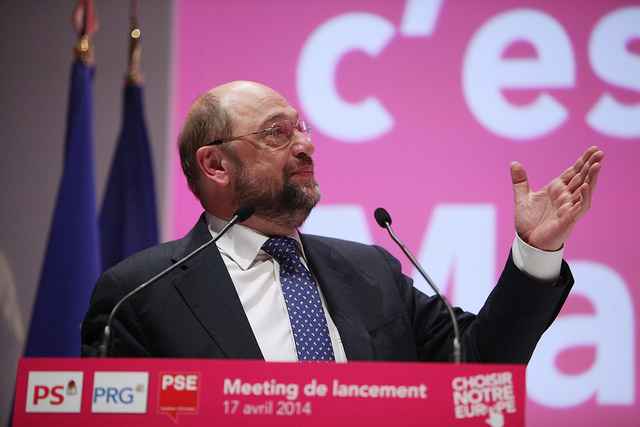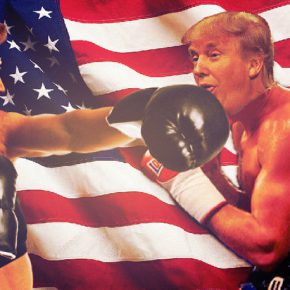Going into the German elections the consensus is that Angela Merkel will once again be reinstated and the grand coalition reconstituted. Many people are taking refuge in the status quo given the instability in the world today. But this election result didn’t look so certain at the start of 2017.
When Martin Schulz became the leader of the Social Democrats in January, the SPD enjoyed a honeymoon with voters where the new leader’s popularity soared. It looked as if the German electorate was hungry for a new administration and the official centre-left might actually have a chance for the first time in over a dozen years out of office.
Outside of Germany, the European liberal intelligentsia began to fantasise about a new centre ground based upon a revived Franco-German alliance. The idea was that the French voters would reject Marine Le Pen in favour of Emmanuel Macron and the German electorate would finally turn away from the CDU and embrace Schulz.
With Brexit and the rise of Donald Trump, the liberal left has been scrambling around for a quick way to revitalize the centre ground. As SPD leader, Martin Schulz became the focus of such vain hopes. He seemed to stand against everything going wrong in the world: a pro-European liberal, who can speak a common sense language of social justice.
Much like how Emmanuel Macron has courted the idea of taking the world order back to the halcyon days of Third Way triangulation. Everywhere liberals began to fantasize about the renewal of the Franco-German compact and the defeat of right-wing populism. The problem is that these neoliberal technocrats are unlikely to reverse the breakdown of the centre ground. This would be made clear soon enough.
The Schulz Slump
After rising in the polls for months, Martin Schulz was expected to trounce regional elections in Saarland, Schleswig-Holstein and North-Rhine Westphalia. In each case, the SPD failed to secure its gains or expand its reach. This was the confirmation that the so-called ‘Schulz effect’ had been overestimated by the media.
Likewise, the French presidential election of 2017 was not simply a re-run of 2002. The majority of French voters did hold their noses to support Macron as a necessary evil to contain the threat of Le Pen, but the number of abstaining voters skyrocketed to 25% of the electorate (more than 12 million votes). Ultimately, Macron’s victory was far less unanimous than Chirac’s 15 years earlier.
The National Front increased its vote from about 18% in 2002 to around 34% in 2017, while the opposition to the FN shrank from 82% to 66%. This didn’t stop liberals from all over the Western world declaring a great victory over fascism. All criticism and all disbelief was immediately suspended. Never mind the shortcomings of Macron as a Blair clone with a start-up neoliberal agenda.
This is the crux of the matter. The Blair legacy in the British Labour Party is being confronted by grassroots activists pushing for the democratisation of the party and a return to social democratic ideals. The French left is engaging in a similar confrontation with the failures of the Socialist Party, but by forging a new politics with La France Insoumise.
Yet there is no such movement in Germany. Instead the Schulz leadership has not deviated from the recent past and prefers to appeal to 1970s nostalgia for Willy Brandt. This is convenient because it avoids any serious assessment of the last SPD administration, which was in power from 1998 to 2005.
Soon after coming to power, Gerhard Schröder made it absolutely clear that the new government would be looking to cut the costs of the welfare state, lower the tax burden for business and undermine protections for working class people. It was very much a part of the Third Way style of politics. It was too much to swallow for some on the SPD left and party chairman Oskar Lafontaine resigned in protest.
As the first Social Democratic government in over 16 years, there were great hopes for Schröder and his coalition with the Greens. In theory, the centre-left could make a comeback now that Germany was reunited and the Cold War was over. But it was not to be.
Nevertheless, the Schröder administration pushed on with what would become known as ‘Agenda 2010’. Not only would the economic reforms produce a 25% tax cut, the Red-Green coalition would reduce state support for health-care, pensions and welfare. The restrictions on temporary employment were lifted, thereby creating a space for a more precarious workforce. These policies were not the only outrages of the Schröder era.
Early on Schröder threw his weight behind the NATO intervention in Kosovo and went on to back the US invasion and occupation of Afghanistan. Yet the SPD would draw a line at Iraq, George W Bush has claimed Schröder was open to supporting the US invasion of Iraq. It may just that Schröder saw that the German public could only be pushed so far and he feared losing the next election.
Instead Schröder joined forces with his friend Vladimir Putin and his French counterpart Jacques Chirac to take a stand against the Iraq war. For a brief moment, it looked like European leaders were taking an independent line from the United States. It wouldn’t be enough to save the SPD though. In the end, it would be the limits of Schröder’s politics that would cost the party its dominance in government.
The Road to Defeat
The 2005 election was the end of the Red-Green coalition and the beginning of the Merkel era, but it did not have to be the case. The CDU/CSU won just over 35% of the vote, whereas the combined vote share of the SPD, the Greens and the Party for Democratic Socialism (PDS) came to 51%. This would have been a strong enough mandate to govern.
In theory, the broad left could have formed a coalition to exclude the right, however, this was not possible due to the historic chasm between the PDS and the Social Democratic Party. For starters, the PDS emerged from the rubble of the German Democratic Republic (DDR) and based its appeal to East German voters on ostalgie – nostalgia for the Communist era. This association with the DDR regime continues to hold back Die Linke, the successor to PDS.
By contrast, the Social Democrats based themselves as the party of post-war compromise and sought to build the welfare state within the limits of capitalism. Slow, gradual reform was tenable in a vibrant West German economy on the frontline of the Cold War. As the SPD had long pitched itself as the acceptable face of the modern progressive centre-left and repudiated any connection with Marxism, the prospect of an open alliance with the radical left did not sit well.
Although the humane achievements of the welfare state were monumental in scale, it should never be forgotten that European social democracy was a project for blocking radical change. The Brandt and Schmidt governments were dedicated to reconciling the working class to life under capitalism. The shift under Schröder took the party away from this aim and foreclosed the possibility of capitalism with a human face.
With this space closed, the Christian Democrats were able to make a comeback with the SPD as junior partners in a grand coalition. Merkel has claimed the centre ground for herself, and she continues to hold this position a dozen years later. It does not make sense to vote for Martin Schulz for this reason: it would make no difference.
Photograph courtesy of Parti socialiste. Published under a Creative Commons license.





